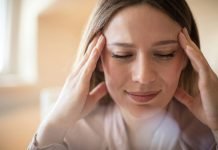
Many people look forward to the end of the day when they can finally rest. However, for some, lying down brings an unwelcome companion: hip pain. Nighttime hip pain can turn what should be a restful period into hours of discomfort and frustration.
This type of pain is not only distressing due to its immediate impact on sleep quality but also because it might signal underlying health issues that need attention.
First off, why does hip pain seem to flare up at night? The reasons are as varied as they are complex. When we lie down, the pressure distribution across our bodies changes, which can exacerbate existing pain in the hip area.
Furthermore, the lack of distractions at night may make us more aware of the discomfort.
However, the causes of hip pain at night are rooted in several conditions, ranging from temporary issues like poor sleeping positions or overexertion during the day, to more serious concerns such as arthritis, bursitis, or even hip fractures.
Arthritis is a common culprit behind hip pain, particularly osteoarthritis, which involves the wear and tear of the cartilage cushioning the hip joints. As the condition progresses, it can lead to inflammation and pain that worsens with inactivity, such as during sleep.
Another common condition is bursitis, an inflammation of the bursae, the small, fluid-filled sacs that cushion the bones, tendons, and muscles near the joints. Bursitis can cause sharp, intense pain at night, especially when lying on the affected hip.
Treatment and management strategies for nighttime hip pain vary depending on the underlying cause. For temporary discomfort, simple home remedies can be effective.
These include applying ice or heat, practicing gentle stretching exercises before bed, and ensuring a comfortable sleeping position, possibly with the aid of pillows for better alignment.
For more persistent or severe pain, medical intervention may be necessary. Medications such as anti-inflammatories can provide relief for conditions like arthritis and bursitis.
In some cases, physical therapy is recommended to strengthen the muscles around the hip and improve flexibility, thereby reducing stress on the hip joint. In severe cases, particularly when the hip joint is significantly damaged, surgical options such as hip replacement surgery may be considered.
Preventing nighttime hip pain starts with maintaining overall hip health. Regular exercise, particularly activities that strengthen the hip muscles and improve range of motion, can be beneficial. However, it’s crucial to balance activity with rest and not to overexert the hip joints.
Maintaining a healthy weight is also important, as excess weight can increase the strain on the hips. For those already experiencing hip pain, adopting a sleeping position that reduces pressure on the hip, such as sleeping on the back or with a pillow between the knees when lying on one side, can help minimize discomfort.
Emerging research continues to shed light on the mechanisms behind nighttime hip pain, emphasizing the importance of early diagnosis and treatment of underlying conditions.
Studies suggest that targeted interventions, tailored to the specific causes of hip pain, can significantly improve sleep quality and overall well-being.
In conclusion, while nighttime hip pain can be a significant source of discomfort and disruption, understanding its causes lays the foundation for effective treatment and management.
Through a combination of lifestyle adjustments, medical treatment, and preventive strategies, individuals can find relief and enjoy a good night’s sleep, free from pain.
As always, consulting with a healthcare provider is crucial for diagnosing the underlying cause of hip pain and developing an appropriate treatment plan.
If you care about arthritis, please read studies about extra virgin olive oil for arthritis, and pomegranate: A natural treatment for rheumatoid arthritis.
For more information about arthritis, please see recent studies about how to live pain-free with arthritis, and results showing medical cannabis may help reduce arthritis pain, back pain.
Copyright © 2024 Knowridge Science Report. All rights reserved.




